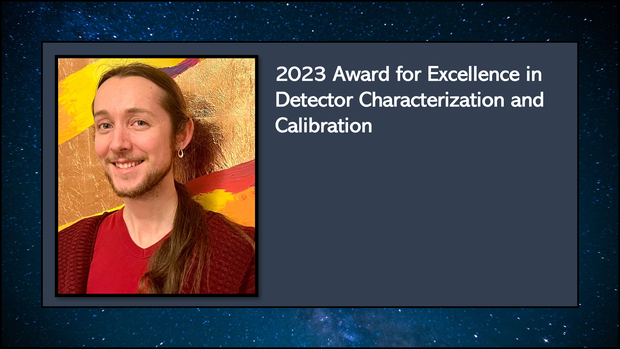
Ansel Neunzert is a postdoctoral scholar at LIGO Hanford Observatory. They received a PhD in physics from the University of Michigan and subsequently taught at the University of Washington Bothell, where they remain an affiliated instructor. Their research interests are mainly in detector characterization with a particular focus on improving detection prospects for continuous gravitational wave searches and other long-duration analyses. They have also worked on projects related to detector calibration and continuous-wave search methods. Outside of LIGO they have a strong interest in physics pedagogy.
Winner of the 2023 Award for Excellence in Detector Characterization and Calibration Announced
News Release • November 21, 2023
The LIGO Laboratory congratulates Ansel Neunzert of LIGO Hanford Observatory and Caltech, for winning the 2023 LIGO Laboratory Award for Excellence in Detector Characterization and Calibration.
This year's award recognizes Neunzert's work on speeding up and automating finding and tracking "line" and "comb" noise features in LIGO detector data. These lines represent very steady features in the data (like the sound from a tuning fork) and can severely impact searches for long-duration gravitational-wave sources, including spinning neutron stars in our own Milky Way galaxy. Previously, lists of lines were generated by time-consuming visual inspection of spectra by experts only once per observing run. After lines were found, more human effort was necessary to identify “combs”, or groups of equally-spaced lines in the frequency space, which can be important clues to possible sources of the noise. Now, Neunzert’s codes produce a thorough, automated analysis daily, weekly, and monthly, as well as at specific times when requested. Their work has vastly reduced the time to identify and eventually mitigate these noise features.
Neunzert’s work is already positively impacting O4 data quality. One example is a 1.66Hz comb structure in the Hanford instrument that Neunzert identified. After iterations of targeted changes in the hardware configurations by the instrument scientists at the site, and Neunzert's quick reanalysis of the interferometer data, this newly found comb was traced to the temperature monitor system for one of the relay mirrors in the LIGO Hanford instrument. The configuration of the offending monitor was changed, and as a result, the comb was eliminated from the data, removing these noise artifacts and increasing our ability to search for long-duration gravitational-wave sources near these former lines.
This important effort may also potentially enable a first detection of long-duration gravitational waves from the Milky Way by the LIGO detectors.
For their work, Neunzert will receive a $1,000 prize and present an invited seminar at one of the LIGO Laboratory sites (LIGO-Hanford, LIGO-Livingston, Caltech, or MIT) to share their achievements with LIGO Laboratory members. Neunzert will also be presented with an award certificate at the next meeting of the LIGO-Virgo-KAGRA collaboration.
Read more about the LIGO Laboratory Award for Excellence in Detector Characterization and Calibration.
Find a list of excellent LIGO Detector Characterization and Calibration projects that earned honorable mention for the 2023 award.




